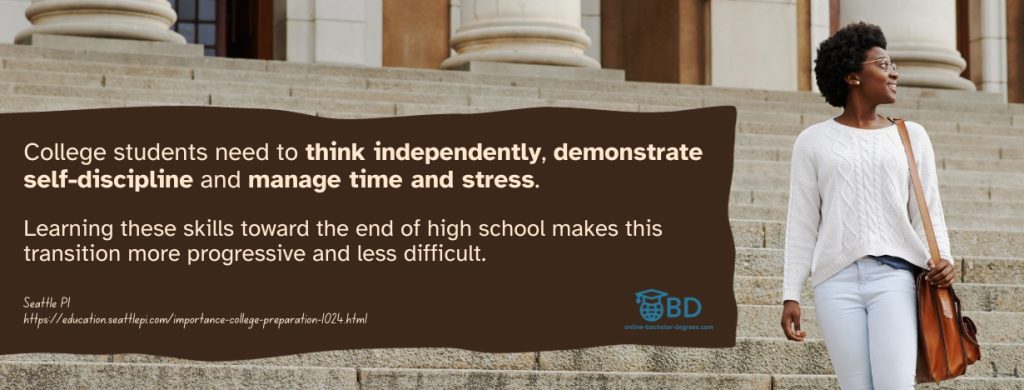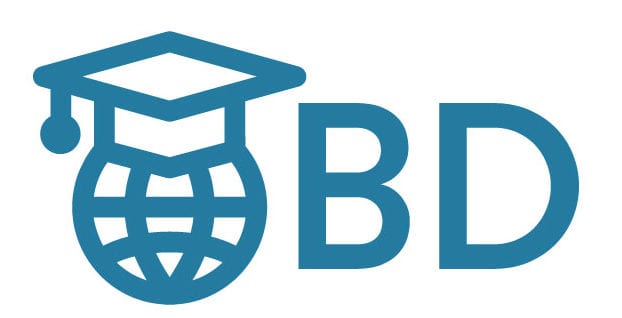A study conducted by The Brookings Institution found that academic preparation is a crucial determinant in the college enrollment of high school students. Indeed, high school students with high GPAs combined with more rigorous coursework and high standardized test scores are more likely to be college-bound.
Of course, the degree of academic preparation has significant variations by race, gender and socioeconomic status, but high school students must start their college-bound preparations as early as possible!
How early is early? We suggest starting during your freshman year in high school because it’s never too early to start planning for college success! But it’s also never too late to start planning, particularly at the start of your junior year and throughout your senior year.

Reasons for Starting Early on College Planning
We understand that your freshman and sophomore years in high school are filled with a combination of anticipation and anxiety – meeting new friends, adjusting to high school life, and making your mark—with little thought given to college planning. But you must start somewhere, and that somewhere is during your junior year, at the latest, because early college planning has its benefits.
Time Flies, and Procrastination Won’t Stop Time
Wasn’t it just yesterday that you were a starry-eyed freshman in high school? Time flies so fast that it can seem like your high school years happened in the blink of an eye!
For this reason, you must start planning your college career as soon as possible instead of putting it off for next year. Otherwise, you may wake up and realize that it’s your senior year and your college plans aren’t on track, if you have any at all. The earlier you start on your college plans, the better your chances of achieving them.
There’s also the matter of many aspects of your college plans not being in your control! You must give allowances for other people’s schedules and preferences that will have an impact on your college applications, such as requesting letters of recommendation. You should also plan for unexpected events that can derail your own college-bound plans and schedules.
Nothing Great Happens Overnight
Stellar academic achievements, commendable extracurricular activities, and high scores on standardized tests don’t happen overnight! More appropriately, these don’t happen in your senior year alone. Colleges and universities will consider your academic performance and non-academic impact during the entirety of your high school years, from your freshman to your senior year, bumps and all.
But it’s also never too late to demonstrate your upward trajectory! For example, your exceptional grades in your junior year, in comparison with your average grades in your freshman and sophomore years, can demonstrate personal maturity and growth. Your choices in challenging courses will demonstrate your commitment to academic rigor and excellence – and these choices should ideally happen progressively.
Even your choices in extracurricular activities require planning – what clubs and organizations to join, what community activities to be involved in, and what sports to be engaged in, among others. This is also true for getting top marks in standardized tests (e.g., SAT or ACT), which partly involves tapping into knowledge learned over your academic career so far.
College Scouting Requires Time and Energy
Ironically, applying to numerous colleges and universities as a way of increasing your odds of being accepted into one of your dream schools is, more often than not, a consequence of little guidance, poor planning, and last-minute panic. College planning experts recommend a balanced list of:
- Safe schools with likely admissions, such as community colleges with transfer agreements, in-state state universities, and colleges with high acceptance rate
- Realistic schools with balanced admissions, such as mid-tier state universities, flagship state universities, and public and private colleges with achievable yet competitive admissions criteria
- Reach schools with challenging admissions, such as Ivy League schools, top-tier private colleges, and highly selective state universities.
With nearly 4,000 institutions of higher education in the United States, it’s a challenge to create a balanced list! But the recommended number is 12-15, with 20 being the maximum number of schools.
You will spend more time and effort than you have planned for on identifying, researching and visiting your list of schools, and then gathering your application documents, sending them to schools, and evaluating your acceptance offers. You must then start as early as possible.
Creating a Compelling Application Package Isn’t Easy
By planning your college applications early, you have ample time to put your best foot forward! Your application package consists of several parts – your transcripts of records, letters of recommendation, and personal statement, among others – and gathering them takes time. More importantly, compellingly presenting them takes even more time, energy and commitment.
Take, for example, listing down your academic achievements, extracurricular activities, and work experiences over four years isn’t as easy as it seems. You must then keep a running record of these things so that when the time comes to highlight them in your application, it’s easier and faster to do so.
The bottom line: When you plan for college as early as possible, you will experience less stress, anxiety and panic during the last stretch of your high school years! Your acceptance into your dream schools increases, too, because you’ve been preparing for it for some time – and that’s the main goal of college planning.
Benefits of Effective College Planning

Let’s take it from Benjamin Franklin, who maintained a daily planner designed to maximize every waking hour of his day, who said, “If you fail to plan, you are planning to fail!” Regardless if you plan your college journey in your freshman year in high school or you’re a late bloomer with your college plans started in your junior year, effective college planning is a must. Here are the reasons why.
Improved Mental and Emotional Preparation
The college application and admission process is stressful, from getting high grades and completing the required application documents to making decisions about a college major, enrolling in courses, and financing a college education.
High school students who engage in effective – and early, for that matter – college planning can set realistic expectations of the challenges ahead, develop their mental and emotional resilience in the face of these challenges, and develop effective coping mechanisms.
With appropriate mental and emotional preparation, you will feel more confident and competent – but not complacent – when tackling the college application and admission process. Your confidence and competence will shine through in your resume, cover letter and personal statement, as well as during your interview, too!
In college, your resilience and confidence will be useful, too, particularly as most college students experience both acute and chronic stress that affects their physical and mental health.
Effective Goal Setting
High school students engaged in college planning learn effective goal-setting skills in addition to developing a clear and realistic vision of their academic and career future. Effective goal setting also demands work with specific steps, including:
- State your long-term objectives and break them down into short-term objectives.
- Determine your academic goals, such as achievable GPA targets with regular, honors and AP courses in mind.
- Develop your career goals, which will influence your choices in a college major, internship opportunities, and networking activities.
- Identify your personal development goals, such as involvement in extracurricular activities and development of specific soft skills.
- Set your financial goals, such as a college budget, scholarships and work
- Prioritize your well-being during your high school years that will prepare you for the challenges in college
- Create timelines and deadlines for your college preparation journey
- Seek support from your peers, parents and teachers in planning for and achieving your goals
Changes happen, and plans change. You must be flexible in adjusting your goals but keeping your eyes on the prize – being admitted into your preferred college and thriving in college.
Competitive Academic Preparation
Undoubtedly, effective college planning results in competitive academic preparation, a must when you’re planning on submitting your college applications to selective colleges and universities! By planning your coursework with academic rigor and excellence in mind, combined with well-rounded extracurriculars, your college applications will likely meet the rigorous selection process.
Your focus will also be instrumental in getting high scores on standardized tests, such as ACT or SAT. You may not even retake these standardized tests to get the scores required for admission into selective colleges and universities – and that, in itself, can decrease your stress and anxiety about college.
Well-rounded Extracurricular Development
While academic performance and potential are crucial determinants of acceptance into college, these aren’t the be-all and end-all either! Many, if not most, colleges and universities also consider extracurricular activities, such as sports and recreation, as well as community service, particularly in leadership roles. This is because well-rounded extracurriculars contribute to a well-rounded individual – and that’s what makes for a successful college student!
Efficient Financial Planning
According to US News & World Report, the average cost of tuition and fees among ranked schools range from $10,662 (in-state students at public schools) and $23,630 (out-of-state students at public schools) to $42,162 (private institutions) in the 2023-2024 school year. These amounts don’t include the costs of room and board, traveling expenses, and books and supplies, among other components of the total cost of attendance.
With college costs being expensive, being able to plan early means finding colleges and universities with tuition and fees you and your family can afford while still getting the college education you want. You will also have ample time to find financial aid opportunities aside from federal and state aid, determining which ones you’re qualified for, and submitting their requirements, among other steps.
Your chances of receiving multiple scholarships can also increase because you followed the instructions, submitted on or before the deadline, and created a compelling application package.
Must-do Steps Before Your Junior Year
If you want to start at the earliest possible time for effective college planning, you should perform these preparatory steps in your freshman and sophomore years. Again, you don’t have to be disappointed in yourself or despair about your lack of academic preparation because the best time to start it is now!
In your freshman year, your college-bound academic preparation should ideally include:
- Work with your school counselors and teachers in creating your academic schedule aligned with your graduation expectations and with college admission requirements.
- Take challenging courses, perhaps honors and Advanced Placement courses, in consultation with your academic advisor.
- Identify your personal interests and career plans with your teachers, counselor and mentors.
- Get involved in extracurricular activities, such as community events, sports and clubs.
- Research the types of schools that you want to get into; use online resources (e.g., College Scorecard) and consult with your teachers, counselors and advisors as well as your parents.
During your sophomore year, your academic preparation will cover the following aspects while continuing with the abovementioned steps from your freshman year.
- Consider practice tests for standardized tests (e.g., PSAT)
- Participate in college and career information events
- Discuss your college plans with your parents, including the colleges you want to be in, the majors you’re interested in, and the financial considerations
Remember that with the combination of competitive admissions and the challenging cost of college education, you and your parents must be prepared as early and as well as possible.
Checklist of To-dos During Your Junior Year

Crunch time! Your junior year is your penultimate in high school, and while you’re also busy with your academic studies and co-curricular and extracurricular activities, you absolutely must spend the time, energy and effort on these college-bound preparatory steps.
- Discuss with your guidance counselor about your coursework and its compliance with college admission requirements.
- Confirm the test dates for the standardized tests you’re planning on taking (e.g., SAT, ACT, and PSAT); a six-week allowance for registration is recommended.
- Inquire about the summer opportunities offered by college campuses you’re interested in, an excellent way of finding out about their college life, facilities and amenities, and admission process.
- Prepare for and take the PSAT.
- Start writing your resume and statement of purpose/personal statement.
- Prepare for the SAT or ACT by studying and taking free tests. Register for your choice in standardized test; college admissions professionals recommend passing at least one standardized test before your junior year ends.
- Participate in extracurricular activities if you haven’t done so already.
- Be more serious about your research into colleges and universities. Attend their open houses, campus tours and college fairs, as well as make an extensive file about each institution you’re interested in. Write emails inquiring about the admissions requirements and process, college life, and financial aid, among others, and request for brochures, viewbooks and the like.
- Read college applications or samples to get a feel of the attractive ones that college admissions officers look on favorably.
- Make a list of the teachers, counselors and advisors, among other trusted non-family members, whom you can ask for letters of recommendation for your college applications.
- Research the scholarship opportunities available, including their eligibility requirements, required documentation, and application deadlines. Discuss these financial aid opportunities with your parents, too.
Checklist of To-dos During Your Senior Year
During your summer break (i.e., before your senior year starts), you should plan college visits to colleges and universities that are on your shortlist. You must also discuss with your parents and mentors regarding early action and early decision programs in your shortlisted colleges and universities.
Your plans for financial assistance must also be in their initial stage, such as completion of the federal student aid estimator.
August – October
Once your senior year starts, your effective college-bound academic preparation includes these steps.
- Create a detailed calendar and checklist for crucial information including but not limited to your high school’s application processing deadlines; application documents for your college applications (e.g., official transcripts, personal essays, and letters of recommendation); standardized test registration deadlines and exam dates; duet dates for college applications; and financial aid application forms, supporting documents and deadlines.
- Register for the ACT and SAT if you weren’t satisfied with your score in junior year or you didn’t take it in junior year. You can avail of fee waivers, but be sure to discuss them with your counselor.
- Consult with your counselor regarding your academic progress, particularly your compliance with the high school graduation requirements and college admissions requirements. You may want to consider completing college-level courses at a community college or a local university for college credits, particularly if your grades warrant it or you’re ahead of schedule.
- Make a list of the colleges and universities based on three categories – safe, reach and realistic. You must have extensive information about each school, too, such as its academic programs, student life, cost of attendance and financial aid, and online resources.
- Take advantage of opportunities to get to know your shortlisted colleges and universities on a physical and personal level. Campus visits, attendance at local college fairs, and meetings with college representatives are recommended.
- Discuss with your counselor about fee waivers and with your parents regarding the CSS/Financial Aid Profile, including the required information and, documents and deadlines. Registration should ideally be as early as September.
- Request for your letters of recommendation and transcripts at least 30 days before your college applications are due for submission. Follow your high school’s required process or provide the individuals you’re asking for letters of recommendation from with the college forms, a stamped and addressed envelope, and an outline of your academic achievements and extracurricular involvement.
- Complete and submit your college applications with sufficient allowance before the deadlines.
- Work with your parents in the completion and submission of your FAFSA form and your scholarship applications. Be mindful of their deadlines with at least 30 days as allowance.
- Check that your college applications due by October have been completed and submitted; many colleges with rolling admissions, early action, and early decision policies have deadlines as early as October.
- Finalize your college personal statement or statement of purpose, resume or curriculum vitae, and other application documents.
November
- Complete and send your early action or early decision college applications that are due in November. Be sure to review your college applications and have your parents, teachers and counselors review them before submission.
- Check that your official high school transcripts have been submitted to the colleges and universities you’ve sent applications to.
- Ensure that your ACT or SAT scores have been sent by the testing company directly to the colleges and universities you’re applying to. Every college has its own policy in this regard, so be sure to check it, too.
- Check that the FAFSA form is available on the official website. Keep in mind, however, that it cannot be completed prior to January 1 of the following year.
- Start organizing your regular decision applications, which are usually due in January and February of the following year.
- Register for the SAT exam in January, if necessary. Note that the exam is the last one accepted by colleges for senior high school students applying for admission.
- Submit your scholarship applications.
January – April
- Register for the ACT exam in February, if necessary, since some colleges consider it, too.
- Submit your college applications to colleges and universities with a January 1 deadline; many of the selective schools have either a January or February application deadline.
- File your FAFSA, which should be completed no later than February 1. You should receive your Student Aid Report (SAR) in the mail or via email four weeks after you have completed and submitted your FAFSA form.
- Consider the college acceptances you’ve received, particularly in regard to the financial aid packages offered if the cost of attendance is a concern.
- Communicate with college representatives, particularly admissions officers and financial aid officers, for your questions.
- Discuss your choice of college or university with your parents and your decision about student loans. Note that colleges and universities usually require information about enrollment decisions by May 1.
- Visit your final list of college campuses, either because you want confirmation of your choice or you haven’t done it already.
Even when you have received college admissions decisions during these months, you shouldn’t be complacent with your academic performance! Your choice of college or university will still consider your second-semester transcript, meaning slacking off in the classroom is a huge no-no!
May
- Many, if not most, colleges and universities require a solid commitment combined with a monetary deposit from incoming freshman college students starting May 1. You must be aware of and comply with the admissions process and the requirements of the college that you’re planning on pursuing your bachelor’s degree. You must also accept the financial aid package offered and follow the related instructions about it.
- If you’ve been placed on the waitlist of your desired college, you should write, call and visit the admissions office to make your intentions of being admitted clear. You can take steps to strengthen your application, too.
- Be sure to notify the schools that have sent acceptance letters, but you have decided not to enroll in.
Summer
Now that you’ve successfully enrolled in your dream college or university, your summer vacation can be an enjoyable one! You can also prepare for college life during the summer months by:
- Earn money through summer jobs, which can be used for your college expenses and to boost your work resume.
- Make a checklist of the items, such as school supplies, furniture and furnishings, and electronics, which you will need for college life (i.e., for your housing needs).
- Ask about your housing arrangements if you will be living in an on-campus residential facility. Look for off-campus housing facilities if it’s more beneficial in your case.
- Attend a summer registration and orientation event, if it’s offered by your selected college, where you can meet your future peers and professors as well as be more familiar with the on-campus facilities, amenities and services.
- Sign up for your fall semester courses.
And welcome to your college life! Your intensive preparation in your junior and senior years in high school has paid off, of course, and it’s time to embark on a new adventure.
Tips On Preparing for College During Your High School Years

With that said, you will find the following tips useful in your college planning success.
Work with your parents and family.
Let’s face it – the full support of your parents and family is instrumental in your academic, career and life success! College being a significant transition, tapping into your support system offers several advantages.
- Financial support. Your parents will be providing the required information and documents for financial aid applications, particularly for the FAFSA, and even sign on the dotted line. Your parents will also likely provide financial support for the college application and admission process, from the application fees to the tuition, fees and other components of the cost of attendance.
- Emotional support. With their experience in the college journey, your parents can be a reliable source of emotional support, too, as well as a networking source. Their guidance in choosing the best college, major and career path for you is also valuable, and the shared responsibility can result in smart choices. Plus, getting your parents on board your college planning process strengthens your mutual understanding of family expectations.
Work with your school teachers, counselors, and mentors.
An NCES-published study confirms that support from trusted adults, such as parents and teachers, in the development of high school students’ college plans “was significantly associated with several college-going behaviors.” Indeed, the support of your school teachers, guidance counselor, and mentors will strengthen your commitment to achieving your college-bound plans!
Influential adults in your young life can provide supportive guidance during your academic journey, including personalized advice based on your academic performance, college goals, and personal interests. You will also find their college application assistance to be useful in overcoming the challenges that come with the process. Your school teachers, counselor and mentors are also the best sources for favorable and fair letters of recommendation.
These professionals are also valuable repositories of information about available resources regarding standardized testing (e.g., fee waivers and free reviews and mock tests), financial aid opportunities, and extracurricular opportunities. You can also ask them for information about career paths and life success.
Be systematic and organized in your college planning.
While it isn’t necessary to have an obsessive-compulsive approach to college planning – we don’t recommend it either – being systematic and organized while planning your college journey is a must. Here are a few tips to keep in mind:
- Use a physical and a digital calendar as a master calendar in keeping track of deadlines and other important dates. Using codes, colors and symbols is effective.
- Determine your priorities based on your long-term goals and short-term objectives, as well as based on their importance and urgency. Breaking them down into manageable tasks is effective.
- Use productivity and task management tools to stay on top of application and admission-related matters.
- Review your college plans on a weekly and monthly basis, evaluate your progress, and adjust accordingly, but keep your eye on the prize.
Maintain a well-rounded academic and non-academic profile.
As previously mentioned, colleges and universities adopt a holistic approach in their application and admission process, meaning academic performance and potential are weighed with extracurriculars.
Aside from taking challenging courses and maintaining good grades for a well-rounded transcript, you must also showcase your leadership and team player skills, personal interests, and unique qualities. Your high school life, after all, isn’t just preparation for your college life – it’s a time for self-discovery, enjoyment and fun, too!
In conclusion, preparing for college during your junior and senior years is a journey in itself. As a journey, you should find ways for it to be rewarding and fulfilling, too, as well as take your peers, parents and family, and teachers, counselors and mentors along for the adventure. You will find that by sharing your college planning experience, you’re enriching your life and theirs, too.
Additional Resources:
